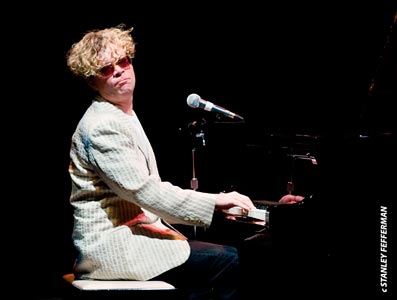 |
| The Art of Time – Words and Music |
|
| October 2, 2008 • Enwave Theatre • Toronto |
|
|
|
|
|
|
| Report by Jessica Lombardi with photo by Stanley Fefferman |
| Words are inherently musical with the ability to take on tonal and rhythmic properties to communicate a feeling and a message to the listener. Upon recognition of the unique relationship between music and text, The Art of Time ensemble put together Words and Music, a concert of verbal and musical expression. Very well put together, the evening’s program drew a large audience of both music and literature enthusiasts, and did not fail to keep the viewers engaged, in the moment, and gripping the edge of their seats. The artistic director for the Art of Time, Andrew Burashko, carefully put together specific texts with particular compositions to speak about the many relationships that words (lyrics, syllables, poems, and other texts) can have with music. |
| A truly intelligent leader and virtuosic pianist, Burashko brought together an ensemble of professionals from Canada and around the world, including musicians Max Christie (clarinet), Jonathan Goldsmith (piano), Kate Haynes (cello), Gregory Hoskins (vocals), George Koller (bass), Blake Manning (drums), Hugh Marsh (violin), Justin Rutledge (guitar/ vocals), Mayumi Seiler (violin), Julia Wedman (violin), Michael White (trumpet), and Christine Bougie (guitar), with celebrated readers Ted Dykstra (actor/ director), Michael Ondaatje (author), and Rick Roberts (actor/ playwright/ director). |
|

Ted Dykstra |
|
| The first set of the program included the works: I Thought about you (J. Mercer/ J. Van Heusen) performed as a jazz standard after the reading of August Kleinzahler’s poem A History of Western Music: Chapter 29; César Franck’s four-movement Violin Sonata in A Major, with each movement played after selected excerpts from Marcel Proust’s fictional text Remembrance of Things Past; and the music of Little Richard set perfectly alongside the dramatic reading of Scene From Fire (P. Ledoux/ D. S. Young).
The second set incorporated text from Michael Ondaatje’s novel Divisadero put to new music by renowned film composer Robert Carli and the songs of Justin Rutledge inspired by texts written by Michael Ondaatje and Guy Vanderhaeghe. The highly-anticipated conclusion was a dramatic reading of Allen Ginsberg’s famous poem Howl to the highly experimental music of composer and performer Jonathan Goldsmith. The performances were practically flawless, with only minor slip-ups in the readings; however, the stage design was a major disappointment. At times, the musicians were performing in front of one another blocking the audience’s view of the performers and instruments.
Overall, the evening was very successful in communicating just how music — jazz, 19th century Romantic, rhythm & blues, folk rock, and 20th/ 21st century avant-garde — is capable of reflecting a wide range of narrative text — be it a novel, poem, book, or other form of text. There was always an unspoken relationship between the music and the text, whether accompanied or unaccompanied by one another.
The music was often so powerful that the mental state of the writer and the composer was vividly apparent. The music responded to the words and reiterated them in new musical terms; they both took on many levels of meaning and worked together peacefully to communicate with the audience the concepts and feelings stored within both arts. Words and Music was a rare opportunity to experience the two as one art.
|
|
|
|
|
|


